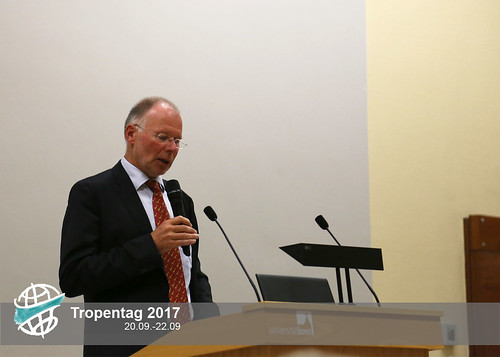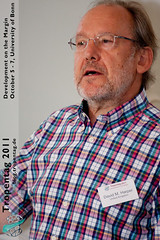social-ecological systems

“Smallscale Organic Agriculture is a Niche”
Mon, 10/02/2017 - 16:17 — marlemke“Small-scale organic agriculture is a niche” said Hans-Joachim Preuß, the managing director of GIZ, the largest development aid agency in Germany. Apparently, the future of development is large-scale industrial agriculture and big investment, according to the agenda of GIZ. “Smallscale organic agriculture won’t save the world”, said Hans Braun, director of the CGIAR Research Program on Wheat at CIMMYT, a research and training institution focused on wheat and maize. I wondered, what happened to sustainable agriculture?

The excitement and expectations of the participants of Tropentag about this year’s theme “Future Agriculture: Social-ecological transitions and bio-cultural shifts” didn't flag and were mostly met throughout the week, at least until the last two keynote speakers. Braun suggested further intensification of grain cultivation, as well as greater collaboration with the GIZ. Braun’s statements were reinforced by Preuß, who said organic products were to “only" address a “niche market”.
The Multiple Collapse of Lake Naivasha - Approaching the Complexity in Social-Ecological Systems
Sat, 10/08/2011 - 20:34 — De-Registered User David M. Harper, from the Department of Biology at the University of Leicester, is doing research at Lake Naivasha in Kenya for 30 years now. As an ecologist, he tried to understand the straight forward limnology of the lake. "And then I realised after about three or four years that the reason that the lake was functioning unpredictably was because it was full of alien species."
What he learnt during this time reveals a lot what science is about. Simple explanations may be right for simple problems. But when it comes to ecological dynamics being influenced by humans and the other way around there is no such thing as simplicity. Therefore a more comprehensive approach is needed than a single discipline can offer.
That is why Mr. Harper's work is an invaluable contribution to the understanding of the endogenous functioning of the system. But how to deal with external shocks, changes in governing institutions or the drastic increase in population? What are the consequences for the demand towards the lake? Can illegal water abstraction be prohibited by the existing institutions?
David M. Harper, from the Department of Biology at the University of Leicester, is doing research at Lake Naivasha in Kenya for 30 years now. As an ecologist, he tried to understand the straight forward limnology of the lake. "And then I realised after about three or four years that the reason that the lake was functioning unpredictably was because it was full of alien species."
What he learnt during this time reveals a lot what science is about. Simple explanations may be right for simple problems. But when it comes to ecological dynamics being influenced by humans and the other way around there is no such thing as simplicity. Therefore a more comprehensive approach is needed than a single discipline can offer.
That is why Mr. Harper's work is an invaluable contribution to the understanding of the endogenous functioning of the system. But how to deal with external shocks, changes in governing institutions or the drastic increase in population? What are the consequences for the demand towards the lake? Can illegal water abstraction be prohibited by the existing institutions?




